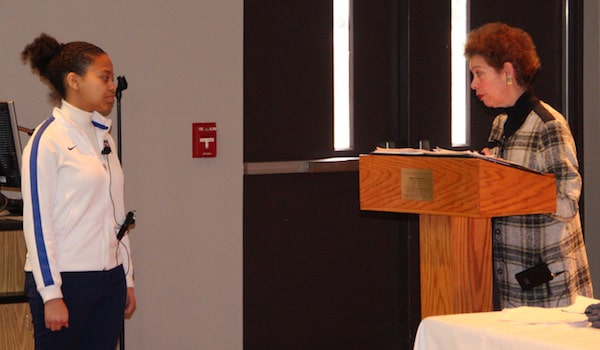Teen court offers remedies to young offenders

Pictured, retired judge Annette Eckert (right) hands down sentencing determined by teen jurors to a young offender (portrayed by St. Clair County Teen Court juror Charlene Coates) during a mock teen court trial Friday at the Southwestern Illinois College Red Bud campus. (Sean McGowan photo)
During a mock trial last Friday, a young offender stood before a jury in a dimly lit lecture hall awaiting her sentence after being arrested for criminal trespass and possession of cannabis.
A charge was never handed down by the local state’s attorney for the misdemeanors she committed. Instead, Smith would have the opportunity to keep her record clean if she agreed to perform remedies assigned by a jury of her peers.
This method of rehabilitating teen offenders in the community started in 2014 in St. Clair County. After four years, retired judge Annette Eckert, who is the program director, said St. Clair County Teen Court has graduated more than 100 youth from the program.
Monroe-Randolph Regional Superintendent of Schools Kelton Davis said he hopes to see the same level of success in the two counties he serves. Having spoke with Monroe County State’s Attorney Chris Hitzemann, Davis added a teen court should be implemented for the two counties no later than July.
“We want to get this going sooner than later,” he said.
Such a program is meant for first-time, non-violent youth offenders. This includes misdemeanors or felonies, such as forgery or theft. Davis said funding will come from the Monroe-Randolph Regional Office of Education for the first two years of the program.
To get the program up and running for Monroe and Randolph counties, Davis said stakeholders in the counties will need to confer over logistics such as a location and how offenders will be referred to the program. Jurors must also be chosen from the community.
“It’s not something we can just do willy nilly,” Davis said.
In order to introduce the program to law enforcement, state’s attorneys and others who would participate in Monroe and Randolph counties, an informational meeting took place Friday at Southwestern Illinois College in Red Bud.
The meeting included a mock trial to demonstrate the teen court process. The young offender, portrayed by St. Clair County Teen Court juror Charlene Coates, presented her case to a peer jury. The jury chose five remedies for her.
Such remedies included writing letters of apology to each parent, performing community service at the local food pantry, reading the book “Suburban Junky” by Jude Hassan about a former heroin addict, and writing a 200-word essay after interviewing an inmate convicted of the same crimes.
A law enforcement officer accompanies teen offenders for every community service assignment. According to Eckert, this establishes a mentor relationship with the teen.
Another remedy the teen jurors have offered involves the offender drawing up a vision board. A vision board in this instance refers to putting together a board that displays the person’s goals and how he plans to achieve them.
“It’s very motivational for all of us,” Eckert said of the vision board concept.
In more serious situations, such as when a kid faces problems at home, counseling is sometimes recommended. Kids are given 90 days to complete their remedies before reappearing before the teen court.
If they are successful, the teens graduate from the program with no criminal record. Eckert said she enjoys the graduation part of the program and hearing the graduates’ testimonies.
“I can’t tell you how many teens have stood here at graduation that have said, ‘It was the essay I wrote,’” she said. “I remember the first time someone said that, they had to pick me up off the floor. I couldn’t believe it.
“So I asked him, ‘What was it about the essay?’ He said, ‘When I had to write about it, I had to think about it. And that made all the difference.’”
In instances when offenders fail to complete the remedies or become repeat offenders, they are no longer eligible for the program and will be charged for their crime. However, Eckert noted the recidivism rate for the St. Clair County Teen Court is less than 6 percent.
“We had goals and we surpassed them. We’ve really come a long way in the past several years,” Eckert said of the program’s success. “I’m pretty happy with it.”
Eckert pointed to the teen jurors as the reason for the program’s prosperity, saying they are creative in how they deal with the offenders. There are 81 peer jurors in the St. Clair County Teen Court.
“I think they do a wonderful job. And that’s what it’s all about,” she said.
Also during the Friday informational meeting, a panel of St. Clair teen jurors had the chance to speak on their experience. Nicole Elmore said she has enjoyed the volunteer opportunity it has provided.
“I love it. Teen court is such a great thing to be in,” she said.
Malihk Good said he has learned a lot from the program.
“This has changed my life because I’m not a troubled kid and I was being called a delinquent,” he said. “I think it’s humbled me because I never expected to be here.”
Teen jurors are selected in St. Clair County based on several criteria. Among these, a juror must be between the ages of 13 or in the ninth grade and 17 or in the 12th grade. The applicant must also live in St. Clair County.
Once a teen is selected to be a juror, an orientation/training follows with an overview of the program. Teens learn about confidentiality, appropriate behavior and dress, deliberating techniques, and the role of the police department and other agencies involved.
The court acts in much the same way as a criminal court with bailiffs, court clerks and the like. The teen jurors also look at three restorative justice aspects with every case. These include how to hold the offender accountable, how the offender can repair harm to all victims and what the offender needs to become a productive member of the community.
“The St. Clair County Teen Court emphasizes accountability and responsibility rather than traditional punitive measures, thereby focusing on balance and restorative justice,” reads an online brochure of the program.
Davis said he was inspired to bring a teen court to his two counties when he witnessed a proceeding in St. Clair County. According to Davis, the program will serve as a way to correct teens going down the wrong path.
“It’s a really good opportunity for a wake-up call rather than a criminal record,” he said.
Additionally, Davis said he would like to have one teen court for both the counties since they do not get as many offenders as St. Clair County. He also said having one court will allow for situations where Randolph County offenders will be judged by Monroe County teens and vice versa.
“It enhances the impartiality of the jury because they won’t know the offender at all if they’re from another county,” he said.
Hitzemann said he looks forward to the early intervention the program will provide.
“I’m hugely in favor of it. From everything I’ve read, it’s had overwhelmingly positive results,” he said.
The teen court idea was made possible by the Illinois Juvenile Court Act, which originally provided a funding mechanism for administering a teen court. Eckert said the grant was pulled by the state and funding must now be supplied by the community.
For more information on the teen court initiative, go to law.siu.edu/_common/documents/teen-court-manual.pdf.






